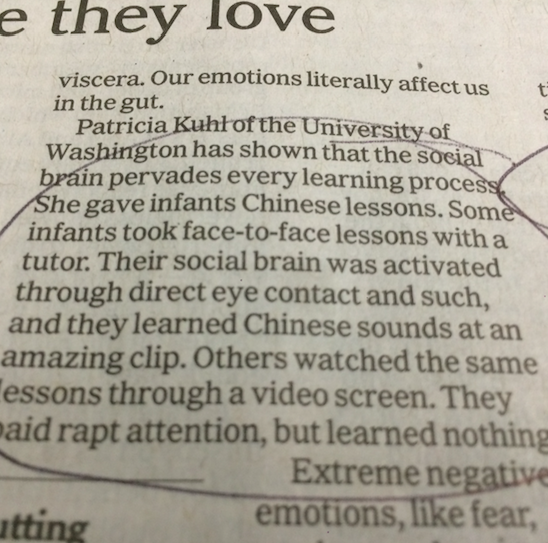
I thought that ‘executive summary’ nursery rhymes, for time-pressed parents to read to their children, were bad enough. I think this might be worse. Not only are we removing human interaction, we are allowing Big Tech to listen in on our children.


I thought that ‘executive summary’ nursery rhymes, for time-pressed parents to read to their children, were bad enough. I think this might be worse. Not only are we removing human interaction, we are allowing Big Tech to listen in on our children.
As I’ve said many times before, trends tend to bend. Counter-forces and negative feedback loops tend to build up and send things off in a direction that’s opposite to the one most people expect. Case in point – too little information. Everyone, more or less, knows about Too Much Information (TMI), but much of this ‘information’ is shallow, trivial and meaningless. (See ‘Filter Failure’ – Sharkey 2009). But, more importantly, because people are starting to feel that nothing that’s digital is ever totally secure they’re starting to get very cautious and not to write things down. The result might well be that very important documentation is ceasing to exist. Think about political decisions taken during periods of crisis. Historically you’d have diaries, minutes of meetings and so on. But what if we don’t? What if the real issue isn’t Too Much Information (TMI) but Too Little Information (TLI)?
An idea proposed by the Canadian historian Professor Margaret MacMillan.
Listen here (around 20 minutes 40 seconds in).

Great little piece in the New York Times recently, which basically says students learn from teachers they like and that emotional connection is key.
Read this. It’s interesting.
I’ve been in Bangkok for a while and for no conscious reason decided to take along an old copy of Zen and the art of motorcycle maintenance, which rather charmingly has a paper till receipt inside dated the 10th March 1993 (it’s hard to even read this now it’s so faded). This is certainly when I bought the book, although whether I actually read it then is debateable. Anyway, it’s a really great book and if you’ve not read it you should.
The above is from the opening pages and remember this was written in 1974. There’s also a lovely bit about romantic versus classical thinking, which partly explains Brexit (OK, I may be stretching this way too far). The romantic model is also about feelings and may possibly explain why identity and nostalgia can trump econimics. The classic model is all about rational arguments about measurement, money, GDP and money. One can be proven, the other cannot and the two cannot be resolved.
I knew I’d read something else rather relevant to the whole Facebook fiasco – the thought that the decline of Facebook could act like the spread of a virus (the explosion of inactive or deleted accounts being akin to the growth curve of a pandemic). Here’s the article in the Guardian newspaper from 2014:
https://www.theguardian.com/technology/2014/jan/22/facebook-princeton-researchers-infectious-disease
And here’s the study from Princeton (Epidemiological modeling of online social network dynamics) that the article quotes:
https://arxiv.org/pdf/1401.4208v1.pdf
The response from Facebook (or rather the complete lack of a response) in light of the Cambridge Analytica scandal is woeful. Only one thing to do. This btw, is from the Guardian and pretty much sums up Zuck’s attitude don’t you think?
Oh, one other thing. Eton. I think the school bears some responsibility for Alexander Nix. Something I wrote last year below…
Another consideration is that, by default, any narrow focus on academic subjects gives certain supposedly intelligent students tacit permission to behave like complete psychopaths at school and later within society at large.
If the system doesn’t value or measure morality or good character then it turns a blind eye to people that don’t have any and who, quite frankly, shouldn’t be let into or out of school in the first place. Under the current system, all that counts is that students pass their exams. What many schools want are kids that achieve high scores, thereby making their own rankings look good. From there ‘successful’ students can move seamlessly into a handful of top universities and thereafter into a select group of organisations. At this point their confidence most likely solidifies into arrogance and their brains go to their heads. Have you met any modest CEOs recently?
Best thing I’ve come across in a while. Center for Humane Technology. (Thanks Kevin).